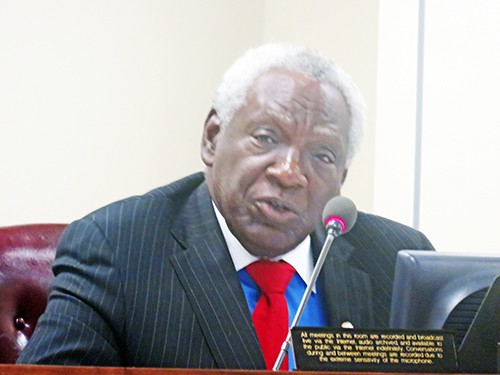 JB
JB
Bailey: ‘It’s politics…but I’m a big boy.’
The looming Cold War between factions on the Shelby County Commission has abruptly thawed before it had a chance to settle into a deep freeze. By a vote of 10-1, with Democratic Commissioner Walter Bailey being the lone holdout, the Commission voted on Wednesday to approve chairman Justin Ford’s committee appointments.
Technically, the vote was taken by the Commission’s general government committee and will need to be ratified by the Commission as a whole in Monday’s general public meeting, but there seemed little doubt that the standoff that had stalled acceptance of the appointments at the body’s September 22 meeting was over with.
That fact was signaled early on when Republican Commissioner Steve Basar, who had voted with Bailey and five other Democrats to refer the appointments back to committee in September, announced that he intended to vote for them on Wednesday. Basar maintained that he had voted the way he did at the earlier meeting merely as a “courtesy” to Bailey and others who had wanted a review of the matter.
But a final shot was fired by Basar, last year’s vice chair, who had seen his own expectations of being chairman rejected by most of the other Commission Republicans, who ended up voting for Democrat Ford (in preference to Bailey, a more zealous foe of the GOP agenda, Republican member Heidi Shafer had explained).
Basar had turned up at a meeting last week of the Shelby County steering committee to protest the abandonment of his candidacy by his party-mates (save for George Chism) and offered criticism of GOP Commission colleague Shafer by name and others by implication for casting their votes for, as he put it, on behalf of “a Democrat,” Ford, instead of for himself.
Shafer had responded that she voted for Ford when it became obvious that no Republican, either Basar or colleague Terry Roland, who was also nominated, had enough votes to be elected chairman. Other Commissioners present at that meeting and several steering committee members at large backed Shafer on the point, and Basar had found himself hot-boxed fairly vigorously to align himself with the majority of Republicans on the Commission.
Though he did indeed vote to accept Ford’s committee recommendations on Wednesday, thereby assuring they would pass muster, Basar complained about his GOP colleagues’ “bullying tactics” and their imposition of a “litmus test,”whereby Republicans were expected to vote as a bloc.
When six Republicans and one Democrat concur (as had been the case with Ford’s election as chair), “it’s bipartisan,” Basar said, lamenting that, on the other hand, when one Republican happened to join six Democrats, as he had on the referral vote, there were cries of “Throw him out!”
Just as Basar accepted the inevitable, so did Bailey, after his fashion — and only after making extended remarks in defense of his original opposition to Ford’s appointments. He had opposed them, he said, out of “concern about what — and who — is driving this engine.” He contended that “a lot of us had been summarily overlooked” because of “political machinations.”
Ford’s election, he said, bore “all the earmarks of a deal” between Ford and the Commission’s GOP contingent— one which was against the interests of the “inner city.” Without specifying any by name, Bailey said the new chairman’s committee assignments were objectionable in the same way.
“It’s politics, but we’re a political institution. I’m a big boy. I can deal with that.,” Bailey concluded.
Republicans Roland and Mark Billingsley and Democrat Reginald Milton then made brief speeches advocating that the Commission put aside differences for the common good, and the final vote to endorse the Ford committee appointments followed, with Bailey the lone dissenter.
.